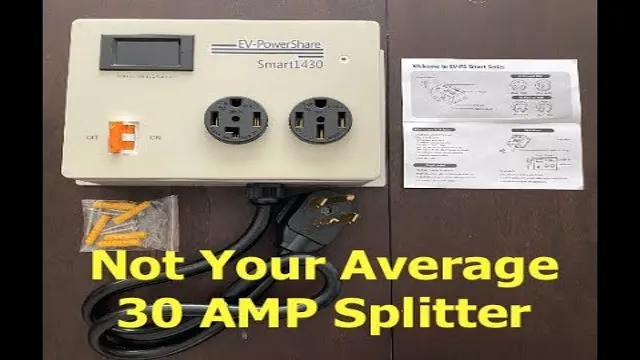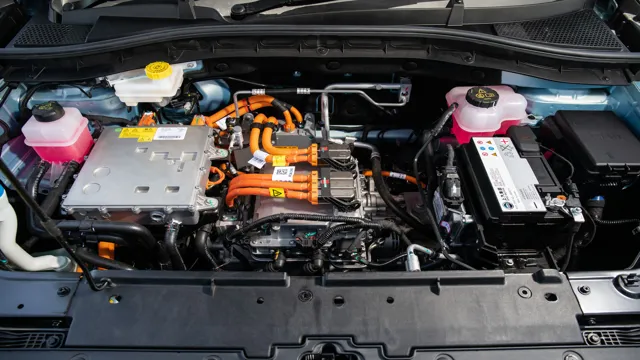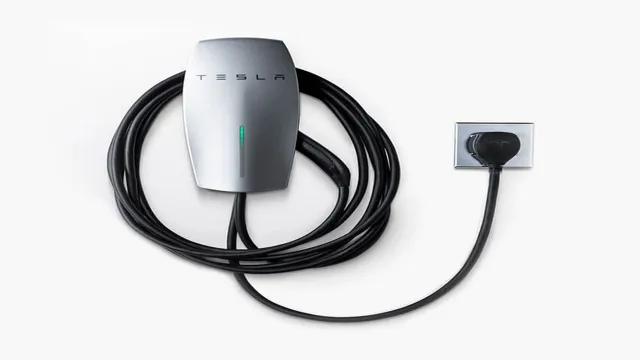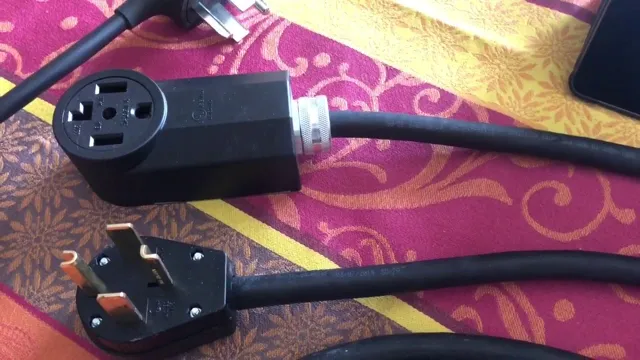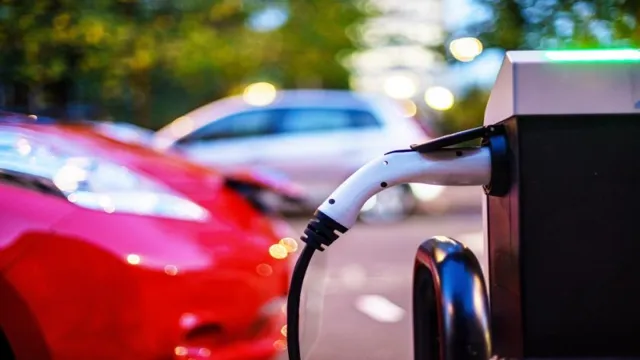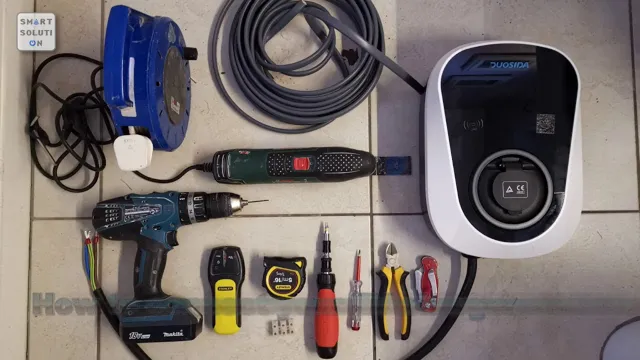Unlocking Convenience: How Using Your Dryer Outlet to Charge Your EV Is a Game Changer
As electric vehicles (EVs) continue to gain popularity, many people are exploring the possibility of charging their vehicles at home. While there are various charging options available, using a dryer outlet is becoming a more common choice. But what exactly does this process entail, and is it a safe and reliable option? First, let’s start with the basics.
A standard EV charging station requires a 240-volt outlet, which is the same outlet used for an electric dryer. By using a specially designed adapter, you can essentially turn your dryer outlet into a charging station for your EV. One advantage of using a dryer outlet is that it’s typically located in a garage or laundry room, making it a convenient location for charging your vehicle.
However, it’s important to note that using a dryer outlet for EV charging does pose some potential risks. For example, if the outlet wasn’t installed properly or isn’t up to code, it could cause damage to your EV or even start a fire. Additionally, using a dryer outlet for EV charging could also lead to longer charge times since it may not provide the same charging capabilities as a dedicated EV charging station.
Overall, if you’re considering using your dryer outlet for EV charging, it’s essential to ensure that the outlet is properly installed and up to code. It’s also a good idea to consult with an electrician or EV technician to determine if this option is the right fit for your specific vehicle and charging needs. In conclusion, while using a dryer outlet for EV charging can be a convenient and cost-effective option, it’s important to approach it with caution and do your research beforehand.
With the right installation and maintenance, this option can provide a reliable and efficient way to charge your electric vehicle at home.
Understanding Your Dryer Outlet
Many EV owners wonder if it’s possible to use their dryer outlet to charge their electric vehicle. The answer is that it depends on the outlet type and the electric vehicle’s charging requirements. Most dryer outlets are 240-volt outlets, which can be compatible with some electric vehicles, but not all.
It’s essential to check the vehicle owner’s manual or the manufacturer’s website to see if it can use a 240-volt outlet for charging. Also, you must ensure that the outlet has the correct NEMA (National Electrical Manufacturers Association) configuration that matches your vehicle’s charging port. It’s crucial to hire a qualified electrician to install the outlet correctly and safely.
While using a dryer outlet to charge your EV might be a convenient option, it’s not suitable for long-term charging needs, as it can cause wear and tear on the outlet and may not provide sufficient power for a full charge. Overall, if you’re considering using your dryer outlet to charge your EV, it’s crucial to do your research and consult with an expert to ensure your safety and the safety of your vehicle.
Voltage and Amperage
Understanding Your Dryer Outlet – Voltage and Amperage When it comes to your dryer outlet, it’s important to first understand the concepts of voltage and amperage. Voltage refers to the amount of electric potential energy that flows through a circuit, measured in volts (V). Amperage refers to the amount of electric current that flows through a circuit, measured in amperes (A).
Your dryer outlet typically operates on 240 volts and 30 amps, meaning that it can handle a higher voltage and amperage than standard outlets that run on 120 volts and 15 or 20 amps. This higher voltage and amperage is necessary to power the heating element in your dryer which requires a lot of energy to dry your clothes efficiently. It’s important to note that if your dryer outlet is not functioning properly, it could be due to an issue with either the voltage or amperage.
If your dryer isn’t heating up properly, it could be due to a low voltage supply. If your dryer is tripping the circuit breaker or blowing a fuse, it could be due to an excessive amperage draw. In either case, it’s important to address the issue promptly to avoid potential safety hazards or damage to your dryer.
In addition, it’s important to ensure that your dryer is plugged into the correct outlet that matches its voltage and amperage requirements. Attempting to plug your dryer into a standard outlet could result in damage to your dryer or even a fire hazard. If you’re unsure about the voltage and amperage of your dryer outlet, it’s always best to consult with a licensed electrician to ensure that your outlet is operating properly and safely.

NEMA Configurations
If you’re looking to plug in your dryer, it’s essential to understand the NEMA configuration for your outlet. NEMA stands for National Electrical Manufacturers Association, and each configuration has a unique set of prongs and voltage requirements. For dryers, the most common NEMA configuration is the 14-30R, which has four prongs and operates on a 240-volt current.
It’s crucial to ensure that your dryer’s plug matches your outlet’s NEMA configuration to avoid any electrical hazards. A simple way to check is to look at the shape and orientation of the prongs on your dryer plug and the outlet. If they don’t match, an electrician can help you install the right outlet or cord.
Overall, understanding NEMA configurations can help you ensure the safety and functionality of your appliances.
Can You Use Your Dryer Outlet to Charge Your EV?
If you’re considering buying an electric vehicle and wondering if you can use your dryer outlet to charge it, the answer is yes, but it’s not ideal. While a standard dryer outlet may provide the voltage necessary to charge your EV, it may not be strong enough to handle the sustained current required for efficient charging. The average dryer outlet provides 240 V, but EV chargers require 30 amps of electricity per hour or more.
Your dryer outlet may not be able to handle this amount of power without overheating or causing a fire. Additionally, using your dryer outlet to charge your EV can cause damage to your dryer and electrical system. It’s always best to consult a professional electrician to install a dedicated EV charging station with the proper voltage and capacity to ensure safe and efficient charging.
Requirements for EV Charging
If you’re considering purchasing an electric vehicle (EV), you must also think about the charging requirements. One common question is whether you can use your dryer outlet to charge your EV. Unfortunately, the answer is no.
Your dryer outlet is a 240-volt Level 2 outlet, but it’s not designed to handle the consistent energy draw required to charge an EV. Moreover, the plug on your dryer outlet is different from the plug used for EVs. For EV charging, you’ll need a dedicated Level 2 charging station installed in your home or garage that is compatible with your EV’s plug type.
This station will provide the necessary power and reliability for your EV charging, allowing you to charge your vehicle overnight and have a full battery in the morning. By investing in the appropriate charging station, you’ll ensure safe, reliable, and efficient EV charging at home.
Adapters and Converters
Yes, it is possible to use your dryer outlet to charge your EV, but you will need an adapter or converter to do so safely and efficiently. A standard dryer outlet typically provides 240 volts and up to 30 amps of power, which is suitable for charging an EV. However, the outlet is designed for a different type of appliance, and the plug is not compatible with most EV chargers.
Using an adapter or converter can help bridge this gap. An adapter simply changes the shape of the plug on your EV charging cable to fit the dryer outlet, allowing you to charge your EV at home. However, be sure to check that your adapter is rated for the correct voltage and amperage to ensure safe charging.
A converter, on the other hand, can be used to transform the 240-volt power from your dryer outlet into the voltage your EV requires. This is a more complex setup and may require professional installation to ensure safety and proper functionality. It’s important to note that using your dryer outlet to charge your EV may not be the most efficient or cost-effective option.
You may want to consider installing a dedicated EV charging station, which can provide faster charging times and may be eligible for tax credits or other incentives. But if you need to charge your EV at home and have a dryer outlet available, an adapter or converter can be a helpful solution.
Safety Considerations
If you have an electric vehicle (EV) and you’re looking for a convenient and cost-effective way to charge it at home, you might be wondering if you can use your dryer outlet for this purpose. Unfortunately, using your dryer outlet to charge your EV is not recommended. While the dryer outlet and EV charging receptacle might look similar, they are not the same thing.
The dryer outlet is designed to supply heavy loads of electricity to a single appliance, like a dryer, while an EV charger requires a dedicated circuit and specialized equipment to safely supply a large amount of power over a long period of time. Attempting to use a dryer outlet to charge your EV can result in costly damage to your EV and create a serious safety hazard. It’s always best to have a licensed electrician install a proper EV charging station in your home to ensure your safety and protect the longevity of your vehicle.
So, the short answer is no, it’s not safe to use your dryer outlet to charge your EV.
How to Charge Your EV with a Dryer Outlet
If you’re wondering, “can you use a dryer outlet to charge an EV?” then the answer is yes, you can. However, there are a few things to keep in mind before you start charging your electric car with a dryer outlet. First and foremost, it’s essential to ensure that your outlet has the correct amperage and voltage ratings for your EV’s charging needs.
Dryer outlets typically have a 240V voltage and can range from 30 to 50 amps, depending on the type of outlet. Be sure to check your EV’s charging requirements to determine if it’s compatible with your dryer outlet. Another factor to consider when charging your EV with a dryer outlet is the length and thickness of the charging cable.
EV charging cables can be thicker and heavier than regular extension cords, which could cause them to overheat if not used correctly. Be sure to use a heavy-duty charging cable that is rated for your EV’s charging needs and is long enough to reach your vehicle’s charging port. In summary, using a dryer outlet to charge your EV is possible, but it’s important to take the necessary precautions and ensure that your outlet, charging cable, and EV are all compatible.
Always prioritize your safety and consult a professional if you have any doubts or concerns about charging your EV at home.
Installation Steps
If you are thinking about charging your EV with a dryer outlet, there are several things you need to consider before installation. First and foremost, you need to make sure that your dryer outlet can support the charging requirements of your electric vehicle. While most modern dryers are compatible, older models may not be able to handle the power output needed to charge your EV properly.
Additionally, you will need to purchase an adapter or cable that can convert your dryer outlet into a charging station. These adapters can be found online or at local hardware stores. Once you have the proper equipment, you can begin the installation process by shutting off power to the outlet and connecting the adapter to the outlet.
After that, you can connect your EV to the adapter and begin charging your vehicle. It is essential to follow all installation instructions carefully to ensure both your safety and the safety of your vehicle. By following the proper steps, you can successfully charge your EV with a dryer outlet and enjoy the benefits of electric driving.
Troubleshooting Tips
Charging your electric vehicle (EV) can be a hassle without the right outlet. If you have a dryer outlet in your home, then you’re in luck. You can use it to charge your EV with an adapter.
A dryer outlet typically provides a 240-volt supply, which is enough to charge your EV at a faster rate. First, you need to purchase an adapter that converts the dryer outlet to a format that your EV can accept. The adapter should include a circuit breaker and a ground fault circuit interrupter to ensure safety.
Once you have the adapter, you can plug it into the dryer outlet and then connect your EV charger to the adapter. It’s essential to check the maximum amperage of your dryer outlet to prevent electrical overloading. If you encounter issues with charging, ensure that the adapter and EV charger are compatible and that the circuit breaker and ground fault circuit interrupter are working correctly.
By utilizing your dryer outlet to charge your EV, you’ll save time and money compared to installing a new charging station.
Conclusion
In conclusion, while technically possible to use a dryer outlet to charge an electric vehicle, it is not recommended and can pose safety risks. The wattage and amperage requirements for charging an EV are much higher than those of a typical dryer, and the outlet may not be able to handle the load. Plus, using an outlet for an unintended purpose puts unnecessary strain on your electrical system.
So, while the temptation may be there to save a few bucks on installation costs, it’s best to stick to a dedicated EV charging station for the safety of your home and the longevity of your vehicle.”
FAQs
What type of outlet is required to charge an electric vehicle?
Electric vehicles require a Level 2 charging station which requires a 240V outlet, similar to a dryer outlet.
Is it safe to use a dryer outlet to charge an electric vehicle?
It is not recommended to use a dryer outlet to charge an electric vehicle as it may not match the correct amperage and could cause damage to both the vehicle and the outlet.
Can a professional electrician install a Level 2 charging station at home?
Yes, a professional electrician can install a Level 2 charging station at home which requires a dedicated circuit and a 240V outlet.
How long does it take to fully charge an electric vehicle using a Level 2 charging station?
It generally takes around 4-8 hours to fully charge an electric vehicle using a Level 2 charging station depending on the battery size and the charging rate.

